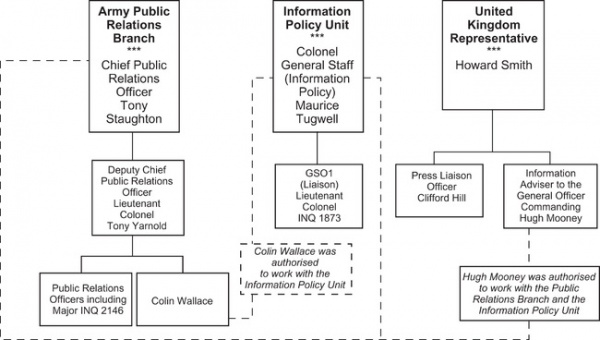Difference between revisions of "Bernard Renouf "Johnny" Johnston"
Tom Griffin (talk | contribs) (photo) |
|||
| Line 1: | Line 1: | ||
| + | [[Image:JohnnyJohnston.png|thumb|right|Johnny Johnston in Hong Kong, 1978. Image ©HKSAR Government]] | ||
Lt.-Col. [[Bernard Renouf "Johnny" Johnston]] was a British Army officer.<ref>[http://www.royaltankregiment.com/en-GB/tothegreenfields.aspx To the Green Fields], The Royal Tank Regiment Association, accessed 12 June 2010.</ref> | Lt.-Col. [[Bernard Renouf "Johnny" Johnston]] was a British Army officer.<ref>[http://www.royaltankregiment.com/en-GB/tothegreenfields.aspx To the Green Fields], The Royal Tank Regiment Association, accessed 12 June 2010.</ref> | ||
Revision as of 17:28, 17 June 2010
Lt.-Col. Bernard Renouf "Johnny" Johnston was a British Army officer.[1]
Background
Johnston had two brothers, Reginald and Gilbert, and a sister Dorothy. He was educated at Tonbridge School in Kent from 1934 to 1938.[2]
Army Career
He served in the 48th Royal Tank Regiment from 1939-41, and in the Royal Armoured Corps from 1941-47.[3] He received an emergency commission as a 2nd Lieutenant on 21 March 1942.[4]
Johnston was awarded the MBE in 1947 "in recognition of gallant and distinguished services in the Netherlands East Indies prior to 30th November, 1946." The London Gazette listed his serial number as 229192.[5]
From 1948 to 1975 he served in the 7th Royal Tank Regiment.[6] He was promoted to the substantive rank of captain in 1948.[7] He was promoted to Major on 14 February 1955.[8] He was promoted to Lieutenant-Colonel on 31 December 1966.[9] Johnston was appointed to the special list on 10 January 1971.[10] Johnston retired from the Army on 1 April 1975.[11]
Ireland
According to Paul Foot in his book Who Framed Colin Wallace 'a new unit' in Army HQ in Northern Ireland in 1970 called 'Information Liaison - later Information Policy' was 'commanded by a military officer with the rank of lieutenant colonel.' 'The first of these', reported Foot, 'was Lieutenant Colonel Johnny Johnston'.[12]
Other sources have named a Lt Col Johnston as involved in psychological operations at the time. For example, John McGuffin cites Peter Watson (in his book War on the Mind) as describing a 'Lt. Col. B. R. Johnston', as 'the foremost British authority on psyops.' At a Psyops training course held on February l4th-15th, 1972, some two weeks after Bloody Sunday Johnston spoke 'about the useful experience that they could all gather from N. Ireland.'[13]
Hong Kong
Johnston headed the Hong Kong government's Information Services Department from 9 June 1979 to 31 December 1979 as Acting Director of Information Services.[14]
In his memoir of the department, Moss describes Johnston's time in charge as follows:
- The man who took over from Slimming, in an acting capacity until Bob Sun's return to the department as DIS on January 1, 1980, was Bernard Renouf Johnston, better known as 'Johnny'. Already thoroughly familiar with the [Vietnamese] refugees issue, Johnston organised special documentary films, booklets and information kits designed to highlight the burden posed for an already overcrowded territory that was not receiving the co-operation it needed from countries far better equipped to share the load. Though he often personally organised briefings and conducted tours of improvised refugee centres, Johnston also busied himself with other departmental priorities, including the importance he attached to recreational events organised by the staff club. For relaxation he embarked on weekend excursions to the New Territories and outlying islands with his wife Gwyneth, a noted authority on butterflies who succeeded in rearing lesser-known species in a special room assigned for the purpose in their government quarters in Mount Austin Road. Together they collaborated on a book on Hong Kong butterflies, published by ISD.[15]
Johnston was still working as Deputy Director of the Department in 1984.[16]
Last Years
Johnston died on the 23 March 2009, aged 88.[17]
Notes
- ↑ To the Green Fields, The Royal Tank Regiment Association, accessed 12 June 2010.
- ↑ Old Tonbridgian News, August 2009, p.15, Old Tonbridgian Society.
- ↑ To the Green Fields, The Royal Tank Regiment Association, accessed 12 June 2010.
- ↑ SUPPLEMENT TO THE LONDON GAZETTE, 3 APRIL, 1942, issue 35509, p. 1498.
- ↑ SUPPLEMENT TO THE LONDON GAZETTE, 26 JUNE, 1947 (pdf), issue 37996, p.2922.
- ↑ To the Green Fields, The Royal Tank Regiment Association, accessed 12 June 2010.
- ↑ SECOND SUPPLEMENT TO The London Gazette Of TUESDAY, the 2nd of MARCH, 1948, issue 38226, p.1617.
- ↑ SECOND SUPPLEMENT TO The London Gazette OF FRIDAY, 18th FEBRUARY, 1955, issue 40412, p. 1083.
- ↑ SUPPLEMENT TO THE LONDON GAZETTE, 10TH JANUARY 1967, issue 44223, p.307.
- ↑ SUPPLEMENT TO THE LONDON GAZETTE, 12TH JANUARY 1971, issue 45278, p. 382.
- ↑ SUPPLEMENT TO THE LONDON GAZETTE, 15TH APRIL 1975, issue 46542, p.4814.
- ↑ Paul Foot Who Framed Colin Wallace?, 1989 London: Macmillan, p. 16
- ↑ John McGuffin 'Afterword' in The Guineapigs 2nd edition Minuteman Press, San Francisco, 1981
- ↑ Peter Moss, Chapter 25: Gearing for the New Millenium, GIS through the Years, Government Information Centre, Hong Kong, accessed 14 June 2010.
- ↑ Peter Moss, Chapter 17: Profound and Lasting Consequences, GIS through the Years, Government Information Centre, Hong Kong, accessed 14 June 2010.
- ↑ The Bulletin, January 1984, p.47, Hong Kong Chamber of Commerce.
- ↑ To the Green Fields, The Royal Tank Regiment Association, accessed 12 June 2010.

